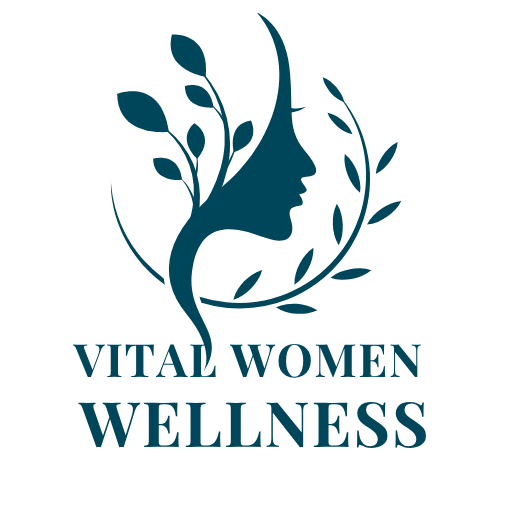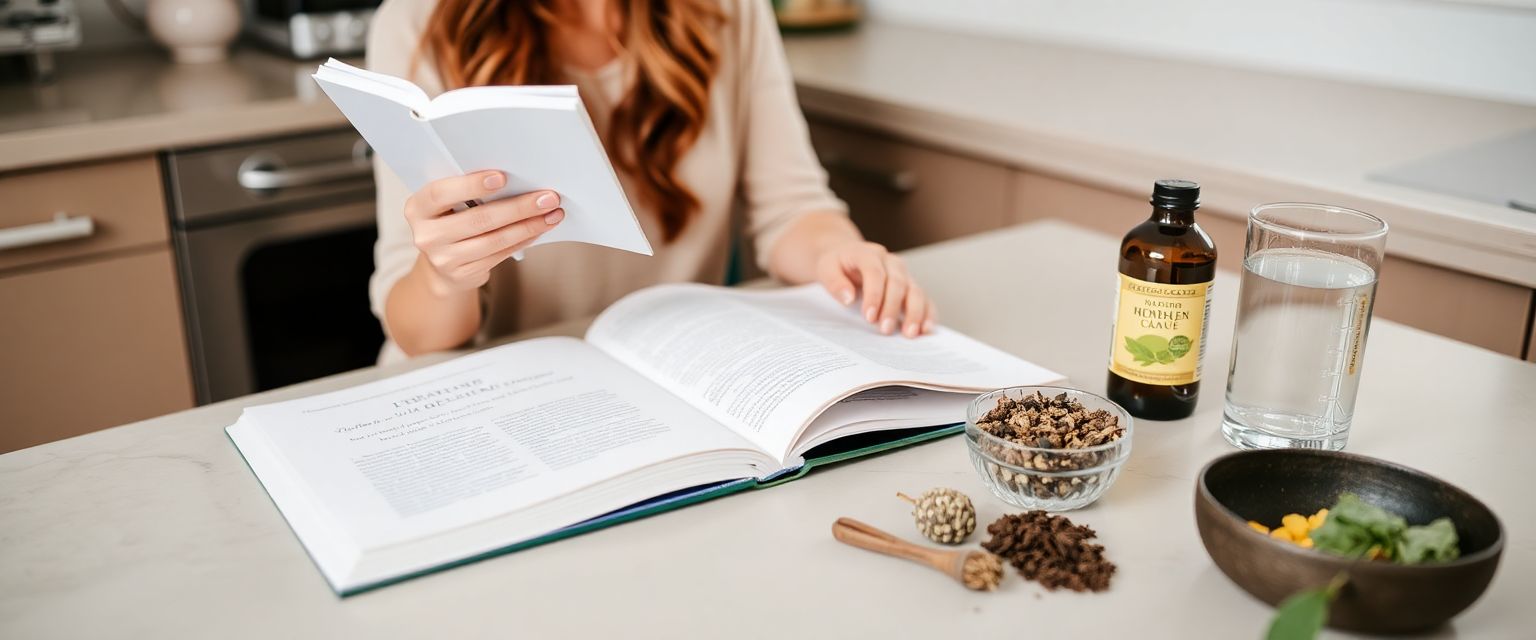Hormonal imbalances can turn your body into a battlefield. I’ve been there, mood swings, fatigue, weight fluctuations, and more.
But nature offers some powerful allies in herbal supplements.
Let me walk you through what I’ve learned about using herbs to support hormonal health.
Understanding Hormonal Balance
Our endocrine system is a complex network of glands producing hormones that regulate bodily functions. When in harmony, we feel energetic, emotionally stable, and physically well.
But stress, poor diet, toxins, and medical conditions can disrupt this balance.
Common signs of hormonal imbalance include:
- Irregular periods
- Mood swings
- Fatigue
- Weight changes
- Skin issues
- Libido changes
While it’s crucial to ask a healthcare professional for persistent symptoms, many find relief through natural remedies, including herbal supplements.
The Importance of Adaptogenic Herbs
Adaptogens are remarkable plants that help the body resist various stressors. They’re my go-to for overall hormonal support.
1. Ashwagandha: The Stress-Buster
Ashwagandha is an ancient Ayurvedic remedy that reduces cortisol levels, our primary stress hormone. By modulating cortisol, it can ease stress and anxiety symptoms often linked to hormonal imbalances.
I’ve found ashwagandha particularly helpful during high-stress periods. It seems to take the edge off without making me feel drowsy or disconnected.
Recommended Product:
Prominent Nutrition Ashwagandha Supplement – Ashwagandha from Prominent is your go-to supplement for overall body balance with a healthy stress response and sense of calm so you feel better all day. Prominent Ashwagandha is uniquely formulated and developed in sunny Florida with premium ingredients and tested by 3rd party US-certified labs to ensure purity, safety, and potency.
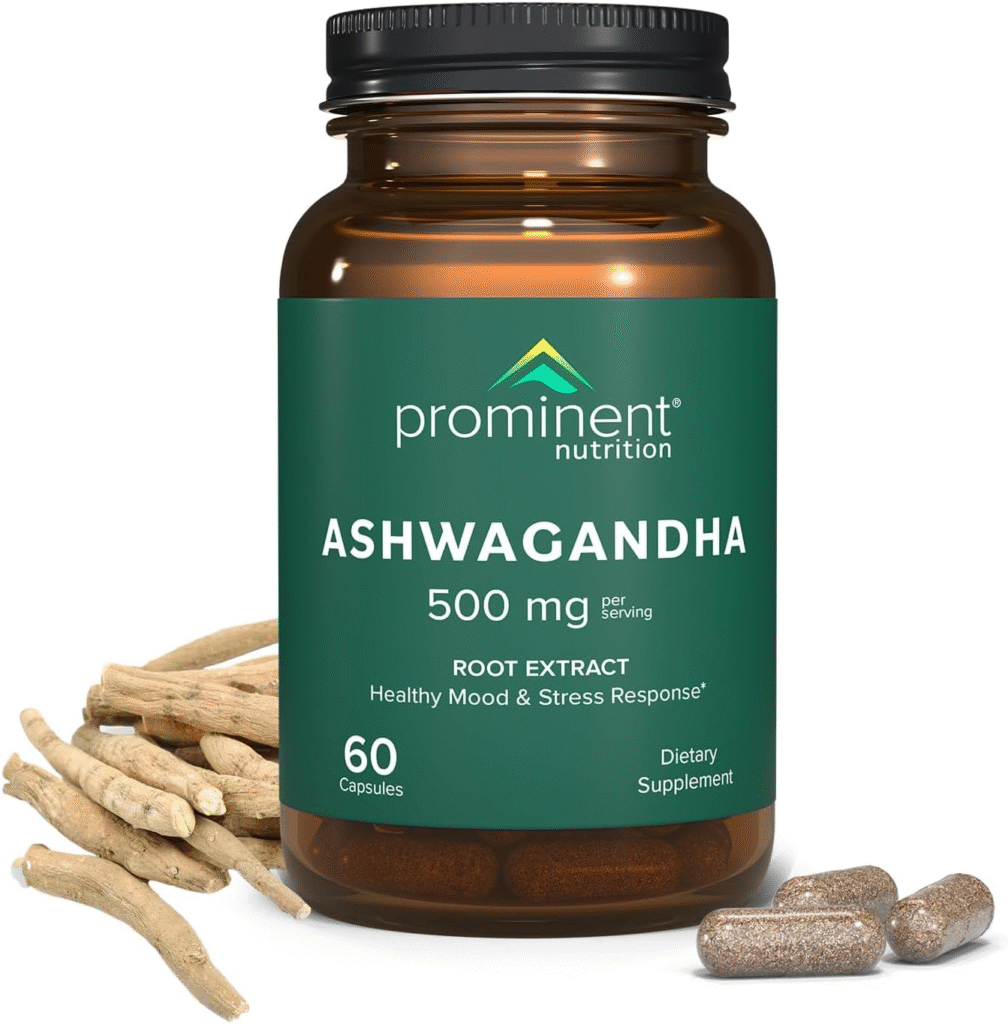
2. Rhodiola Rosea: Energy and Mental Performance Booster
Rhodiola has been used for centuries to combat fatigue and enhance mental performance. Research suggests it balances cortisol levels and supports the body’s stress response system.
When I’m feeling overwhelmed or mentally foggy, Rhodiola often provides a gentle lift in energy and focus.
Recommended Product:
Himalaya Rhodiola Rosea – Himalaya Rhodiola is produced in a cGMP (Good Manufacturing Practices) certified facility. Rigorously tested for identity, strength and safety so you can feel confident in the Rhodiola rosea supplement you take. Himalaya Rhodiola extract improves exercise endurance and helps reduce time to exhaustion it’s also a supplement for daily energy, stress, and well-being.
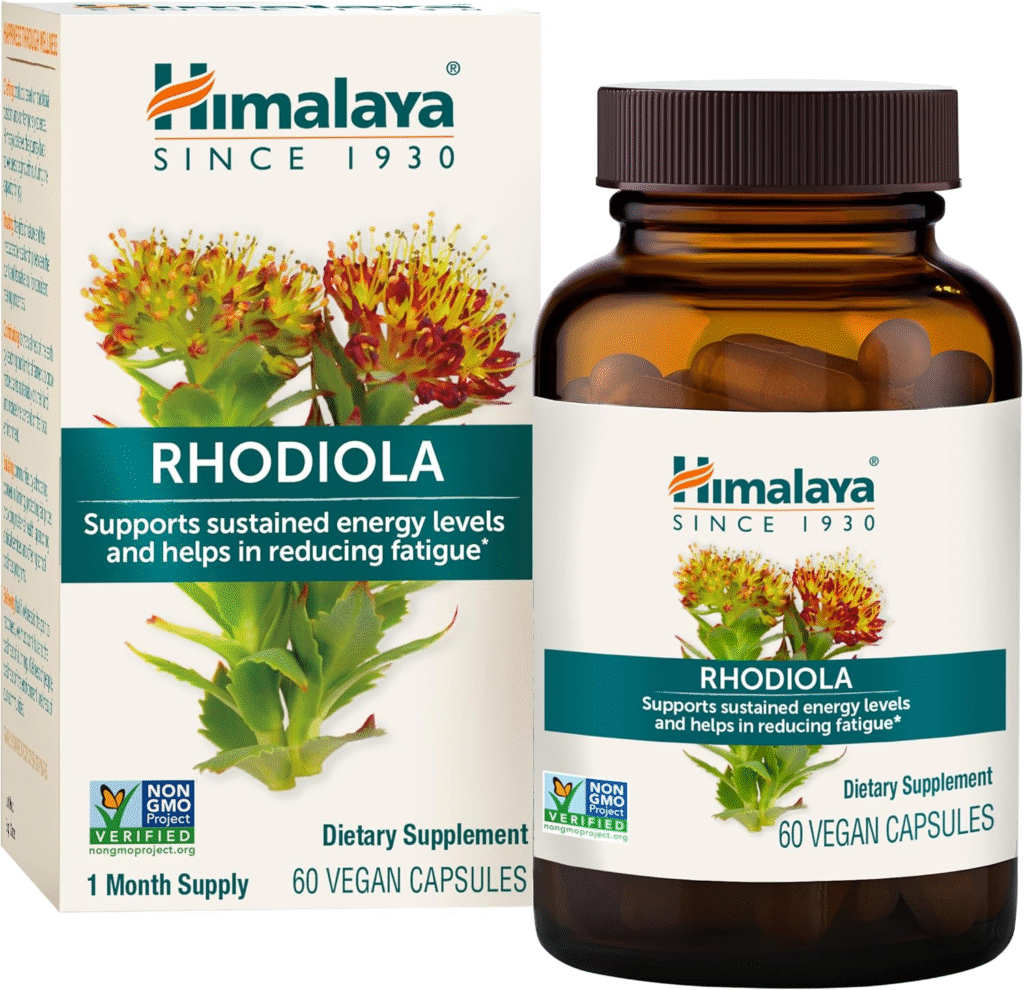
3. Maca Root: Libido and Fertility Support
Maca root has gained popularity for supporting both male and female hormonal health. For men, it may improve libido and fertility.
Women often use it to reduce menopausal symptoms and support overall hormonal balance.
I’ve noticed improved energy and mood when incorporating maca into my routine, especially during particularly stressful times.
Recommended Product:
Pattern Wellness Maca Root – Maca has traditionally been used to help support reproductive health and stamina. When you feel better, you perform better. Maca Root aids in increasing energy levels, while also improving overall mood.

4. Phytoestrogens: Nature’s Hormone Helpers
Phytoestrogens are plant compounds that can mimic estrogen’s effects in the body. While controversial, many women find them helpful in managing hormonal imbalance symptoms, particularly during menopause.
Recommended Product:
SOLARAY PhytoEstrogen – Designed to help support a healthy estrogen balance in women, this scientifically formulated blend is made with estrogen-like plant compounds. Ideal for women looking for menopause support, PhytoEstrogen may help maintain normal bone density and strength as well as healthy skin.
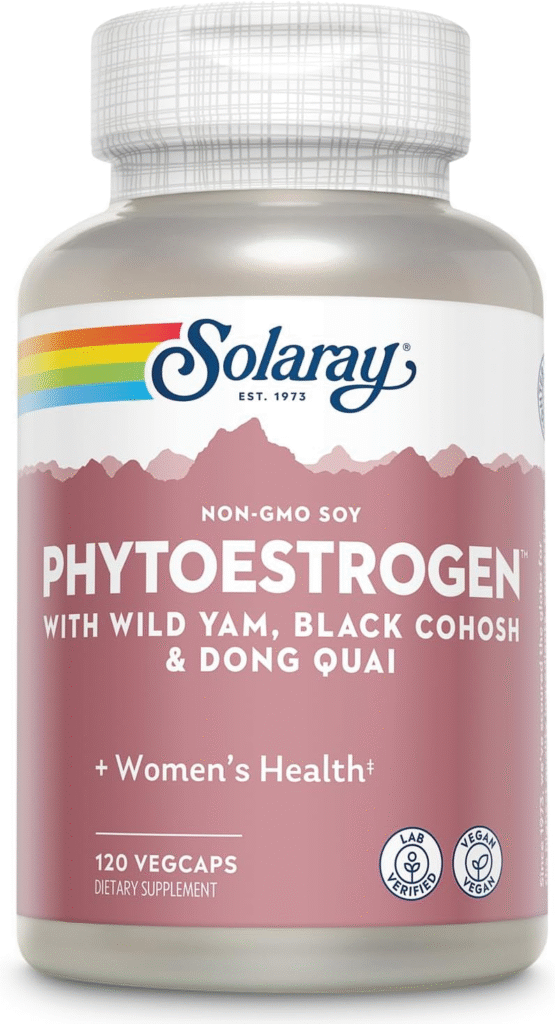
5. Red Clover: Hot Flash Relief
Red clover is rich in isoflavones, a type of phytoestrogen. Some studies suggest red clover supplements may reduce hot flashes and improve bone density in menopausal women.
However, effects can vary, and more research is needed to fully understand the long-term impacts of phytoestrogen supplementation.
Recommended Product:
Vitanica Red Clover – Especially helpful for women in menopause wanting to support relief of hot flashes and night sweats. Also promotes cardiovascular system health. Two month supply.
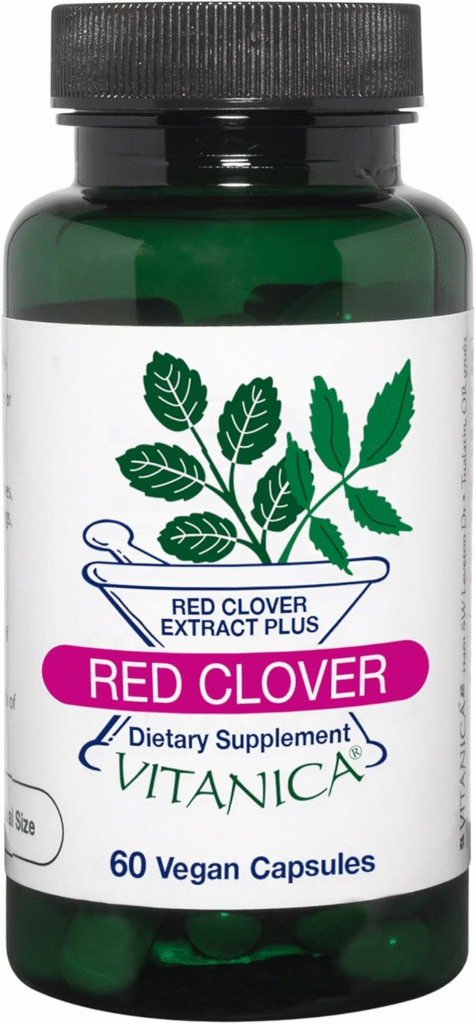
6. Dong Quai: The “Female Ginseng”
Dong quai has been used for centuries in Chinese medicine to support women’s health, particularly for menstrual and menopausal concerns. While scientific evidence is mixed, many women report improvements in menstrual cramps and hot flashes when using dong quai supplements.
I’ve found dong quai helpful for easing menstrual discomfort, but as with all supplements, it’s essential to start slow and listen to your body.
Recommended Product:
Wild & Organic Dong Quai – This dong quai supplement for women is made with vegan ingredients, free from GMOs, and contains no artificial additives and fillers. Wild & Organic dong quai herbal supplements use plant-based ingredients, including a vegetable cellulose coating, making them suitable for vegans.
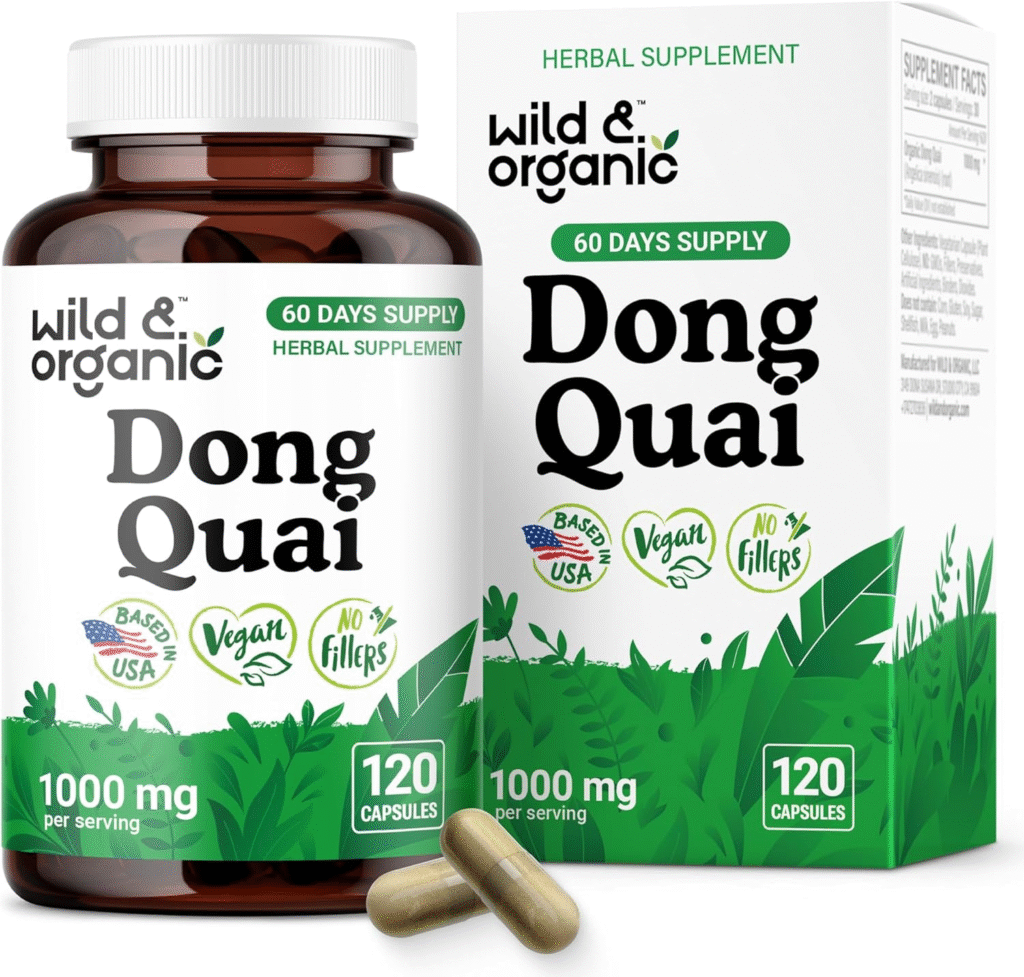
Balancing Female Hormones
For women dealing with PMS, menstrual irregularities, or menopausal symptoms, certain herbs have shown promise in providing relief.
Chasteberry (Vitex): PMS and Menstrual Support
Chasteberry, also known as Vitex, influences the pituitary gland to produce more progesterone, potentially helping to balance the estrogen-progesterone ratio.
Many women, myself included, have found chasteberry helpful in regulating menstrual cycles and reducing PMS symptoms. However, it can take several months of consistent use to see significant effects.
Black Cohosh: Menopausal Symptom Relief
Black cohosh is commonly used for managing menopausal symptoms like hot flashes and night sweats. While the exact mechanism isn’t fully understood, some researchers believe it may have estrogenic effects or influence serotonin receptors.
For women experiencing menopausal discomfort, black cohosh can be a game-changer. However, it’s crucial to use it under medical supervision, especially if you have a history of hormone-sensitive conditions.
Evening Primrose Oil: Hormonal Skin and Breast Pain
Evening primrose oil is rich in gamma-linolenic acid (GLA), an omega-6 fatty acid that may help balance hormones. It’s often used to reduce breast pain associated with the menstrual cycle and may improve hormonal acne.
I’ve found evening primrose oil particularly helpful for managing hormonal skin issues, but as with all supplements, consistency is key.
Supporting Male Hormonal Health
Herbal supplements aren’t just for women – they can also support male hormonal health.
Saw Palmetto: Prostate Health and Testosterone Balance
Saw palmetto is often used to support prostate health and may help balance testosterone levels. Some men use it to address symptoms of benign prostatic hyperplasia (BPH) or to support hair growth.
While more research is needed, saw palmetto is generally well-tolerated and may be worth considering for men experiencing prostate issues or hormonal imbalances.
Tribulus Terrestris: Libido and Athletic Performance
Tribulus terrestris has been used in traditional medicine to enhance male virility and athletic performance. Some studies suggest it may increase testosterone levels, though results are mixed.
For men looking to support their hormonal health naturally, tribulus may be worth exploring, especially when combined with a healthy lifestyle and exercise routine.
Adrenal Support Herbs
The adrenal glands play a crucial role in hormone production and stress response. Supporting adrenal health can have far-reaching effects on overall hormonal balance.
Licorice Root: Cortisol Regulation
Licorice root contains compounds that can help regulate cortisol levels. It’s particularly useful for people with low cortisol or adrenal fatigue.
However, licorice root can increase blood pressure, so it’s essential to use it under medical supervision, especially if you have hypertension or heart issues.
Holy Basil (Tulsi): Stress Reduction and Mood Support
Holy basil, also known as tulsi, is revered in Ayurvedic medicine for its ability to support the body’s stress response. It may help balance cortisol levels and improve mood.
I’ve found holy basil tea to be a calming ritual, especially during times of high stress. It seems to take the edge off without causing drowsiness.
Thyroid Support Herbs
Thyroid imbalances can wreak havoc on overall hormonal health. Certain herbs may help support thyroid function.
Ashwagandha: Thyroid Hormone Balance
In addition to its stress-reducing properties, ashwagandha may help balance thyroid hormones. Some studies suggest it can be particularly helpful for subclinical hypothyroidism.
If you’re dealing with thyroid issues, ashwagandha might be worth discussing with your healthcare provider as part of a comprehensive treatment plan.
Bladderwrack: Iodine Source for Thyroid Health
Bladderwrack is a seaweed rich in iodine, a crucial nutrient for thyroid function. It’s sometimes used to support thyroid health, particularly in cases of iodine deficiency.
However, too much iodine can be problematic, so it’s essential to use bladderwrack under medical supervision, especially if you have existing thyroid issues.
Liver Support for Hormone Balance
The liver plays a crucial role in hormone metabolism. Supporting liver health can contribute to overall hormonal balance.
Milk Thistle: Liver Detoxification
Milk thistle is renowned for its liver-protective properties. It may help support the liver’s ability to metabolize hormones and filter toxins from the body.
I’ve found milk thistle helpful when I’m feeling sluggish or after periods of overindulgence. It seems to give my system a gentle reset.
Dandelion Root: Liver and Hormone Support
Dandelion root is a traditional liver tonic that may help support hormone balance by aiding in liver detoxification. It’s also a natural diuretic, which can help reduce water retention associated with hormonal fluctuations.
Dandelion root tea has become a staple in my routine, especially during my menstrual cycle when I tend to feel bloated.
Hormone-Balancing Lifestyle Factors
While herbal supplements can be powerful allies, they’re most effective when combined with a healthy lifestyle.
Nutrition for Hormonal Health
A balanced diet rich in whole foods, healthy fats, and plenty of vegetables provides the nutrients your body needs to produce and balance hormones.
Some key nutrients for hormonal health include:
- Omega-3 fatty acids (found in fatty fish, flaxseeds, and chia seeds)
- Vitamin D (from sunlight exposure and fatty fish)
- Magnesium (found in dark leafy greens, nuts, and seeds)
- B vitamins (abundant in whole grains and legumes)
I’ve found that focusing on these nutrient-dense foods has made a noticeable difference in my energy levels and overall well-being.
Stress Management Techniques
Chronic stress can wreak havoc on your hormones. Incorporating stress-reduction techniques into your daily routine can make a significant difference.
Some effective stress management techniques include:
- Meditation or mindfulness practices
- Deep breathing exercises
- Regular exercise
- Adequate sleep
- Time in nature
I’ve found that even a few minutes of deep breathing or a short walk outside can help reset my stress levels and improve my mood.
The Importance of Quality Sleep
Sleep is crucial for hormonal balance. During sleep, your body produces and regulates many hormones, including growth hormone and cortisol.
To improve sleep quality:
- Stick to a consistent sleep schedule
- Create a relaxing bedtime routine
- Avoid screens before bed
- Keep your bedroom cool and dark
Prioritizing sleep has been a game-changer for my hormonal health. I’ve noticed improvements in my energy, mood, and even skin quality since focusing on getting quality sleep.
The Importance of Quality and Safety
While herbal supplements can be powerful allies in supporting hormonal balance, it’s crucial to approach them with care and knowledge. Not all supplements are created equal, and quality can vary significantly between brands.
Choosing High-Quality Supplements
When selecting herbal supplements, look for:
- Third-party testing certification
- Reputable manufacturers with good track records
- Clear labeling of ingredients and dosages
- Organic or wildcrafted herbs when possible
I always research brands thoroughly and am willing to invest a bit more for higher-quality supplements. The peace of mind is worth it.
Potential Interactions and Side Effects
Remember that “natural” doesn’t always mean safe. Some herbs can interact with medications or may not be suitable for people with certain health conditions.
Always talk to a healthcare provider before starting any new supplement regimen, especially if you’re pregnant, nursing, or taking medications.
Some herbs to be particularly cautious with include:
- St. John’s Wort (can interact with many medications)
- Licorice root (can increase blood pressure)
- Black cohosh (may not be suitable for people who have liver issues)
I learned this lesson the hard way when I experienced side effects from combining certain supplements without proper guidance. Now, I always ask with my healthcare provider before adding new herbs to my routine.
Getting Started with Herbal Supplements
If you’re new to herbal supplements, start slow and listen to your body. Begin with one supplement at a time, and give it a few weeks to see how you respond.
Keeping a Symptom Journal
I’ve found it incredibly helpful to keep a journal to track any changes in symptoms or overall well-being. Note things like:
- Energy levels
- Mood
- Sleep quality
- Menstrual symptoms (if applicable)
- Any side effects
This record can be invaluable in determining which herbs are most effective for you and identifying any potential issues.
The Importance of Patience
Hormonal balance is an ongoing process, not a destination. It may take some time and experimentation to find the right combination of herbs and lifestyle changes that work for you.
Be patient with yourself and celebrate small improvements along the way. I’ve learned to appreciate the subtle shifts in my well-being, knowing that lasting change often happens gradually.
Frequently Asked Questions
What are the best herbs for balancing female hormones?
Some popular herbs for balancing female hormones include chasteberry (Vitex), black cohosh, dong quai, and red clover. However, the effectiveness can vary depending on person needs and hormonal imbalances.
Can herbal supplements help with menopause symptoms?
Many women find relief from menopause symptoms using herbal supplements. Black cohosh, red clover, and evening primrose oil are commonly used for hot flashes and other menopausal discomforts.
Are there herbal supplements that can boost testosterone naturally?
Some herbs that may support testosterone levels include ashwagandha, fenugreek, and tribulus terrestris. However, more research is needed to fully understand their effects on testosterone production.
How long does it take for herbal supplements to balance hormones?
The time frame can vary widely depending on the person and the specific herbs used. Some people may notice effects within a few weeks, while others might need several months of consistent use to see significant changes.
Can adaptogens help with adrenal fatigue?
Adaptogenic herbs like ashwagandha, rhodiola, and holy basil are often used to support adrenal function and help the body manage stress. They may be useful for those experiencing symptoms of adrenal fatigue.
Is it safe to take many herbal supplements for hormone balance?
While it’s possible to mix certain herbs, it’s important to do so under the guidance of a healthcare professional. Some herbs can interact with each other or with medications, potentially causing adverse effects.
Can herbal supplements interfere with birth control?
Some herbs, particularly St. John’s Wort, can interfere with the effectiveness of hormonal birth control. Always ask with a healthcare provider before combining herbal supplements with any form of contraception.
Are there any herbal supplements that can help with PCOS?
Some herbs that may be useful for PCOS management include cinnamon, spearmint tea, and licorice root. However, PCOS treatment should be comprehensive and overseen by a healthcare provider.
Can men use herbal supplements for hormonal balance?
Yes, there are several herbs that may support male hormonal health, including saw palmetto, ashwagandha, and maca root. These can potentially help with issues like low testosterone or prostate health.
How do I know if I have a hormonal imbalance?
Common signs of hormonal imbalance include irregular periods, mood swings, fatigue, weight changes, and skin issues. However, these symptoms can be caused by various factors, so it’s important to ask with a healthcare provider for proper diagnosis.
Key Takeaways
- Herbal supplements can be powerful allies in supporting hormonal balance, but they should be used as part of a holistic approach to health.
- Adaptogenic herbs like ashwagandha and rhodiola can help the body manage stress and support overall hormonal health.
- Phytoestrogen-rich herbs may offer relief for some menopausal symptoms, but more research is needed to fully understand their effects.
- Herbs like chasteberry and black cohosh may help balance female hormones, while saw palmetto and maca can support male hormonal health.
- Quality and safety are paramount when choosing herbal supplements. Always talk to a healthcare provider before starting any new supplement regimen.
Disclaimer
The information contained in this post is for general information purposes only. The information is provided by A Beginner’s Guide to Herbal Supplements for Hormonal Balance and while we endeavor to keep the information up to date and correct, we make no representations or warranties of any kind, express or implied, about the completeness, accuracy, reliability, suitability or availability with respect to the website or the information, products, services, or related graphics contained on the post for any purpose.
